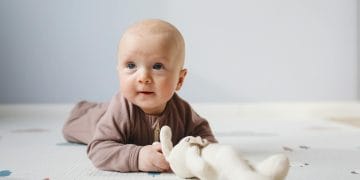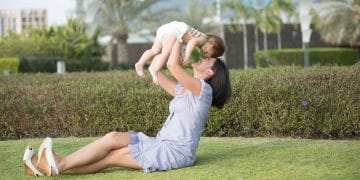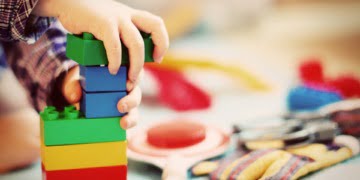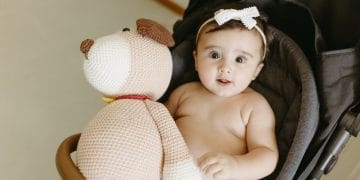Key Notes
- Fine and gross motor skills are essential, and every baby goes through the process of developing them as they grow up
- You can help make your child's muscles stronger and be more effective while performing tasks with certain activities
- While it's natural for babies to reach a milestone earlier or a little later, it's still crucial to keep an eye out for any delay in the developmental milestone
Every baby is different; hence they all grow and learn skills at a different pace. As a parent, it’s important to know the milestones that a child should achieve at a certain age.
Here, in this article, we’ve discussed about the gross and fine motor skills that infants learn.
What Are Fine Motor Skills?
Before talking about the developmental milestones, it’s essential to know what is meant by these motor skills. This term is used to describe the ability of the small muscles present in the body to move, such as the hands and fingers.
These skills also involve the visual motor skills, also known as the eye-hand coordination, in which the baby’s vision, along with the movement of the hand, helps achieve a task, for example, grasping for something, writing, etc.
This is an important skill to learn; otherwise, the child can struggle later in life. Below are the different skills infants develop as they grow.
0 to 3 months
- Ability to grasp another person’s finger or any other object
- Watch their own hands moving
- Put hands in their mouth
- Loud noises can startle them
- Clenched fists
3 to 6 months
- Can move an object from one hand to the other
- Stretches hand to grab objects and puts them in mouth
- Lifts head when lying down on the stomach
- Eyes follow objects in all directions
- Wave arms when they recognize someone
6 to 12 months
- Reach and grab toys
- Picks up small objects and throws them
- Can hold a spoon using the palm
- Can eat using hands
- Grasp objects using the index finger and thumb (Pincer grasp)
- Chew on toys
- Can sit independently for some time
Fine Motor Skills Activities For Infants
To help strengthen your baby’s small muscles and improve their fine motor skills, there are a few activities you can do, such as:
- Rattles: Pick up a rattle or any other toy and put it in front of your child for them to grab onto. Once they grab it, gently pull it so that they hold onto the rattle more strongly.
- Prone Position: Put the baby on its stomach and a toy within reach so that he can lift his head up and reach out to grab the toy.
- Toys: Use a play drum set to let your child bang on them with the drumstick or their hands, putting the muscles to use.
- Food: Use food items such as sliced-up fruits, vegetables, etc., which your child can pick up and learn to eat by themselves.
- Play Dough: Playing with play dough will help the baby with grip.
What Are Gross Motor Skills?
Gross motor skills include movements of the whole body. These skills involve large muscle groups such as the abdomen, legs, etc.
This helps the baby to stabilize, attain proper posture and develop muscles to be able to perform actions such as sitting, standing, running, etc. Just like fine motor skills, these are as important for hand-to-eye coordination skills for the baby.
The gross motor skills for infants to learn as they grow include:
0 to 3 months
- Can lift up head and chest when lying down on stomach
- Kick and stretches arms
- Clench hands
3 to 6 months
- Can roll both ways
- Puts foot in mouth when lying down in a supine position
- Grabs onto feet
- Can sit up with support
- Moves objects from one hand to the other
6 to 12 months
- Sit independently
- Goes from sitting to crawling
- Tries to stand with no support
- Holds hands or furniture to take steps but may start walking as well
How To Improve Gross Motor Skills For Infants
- Pillows: Use pillows to prop up your child, so they can learn how to sit
- Tummy time: Put the baby on their stomach so that they can stretch around and rock side to side. This will help develop their upper body strength.
- Toys: Keep the toy out of reach from the baby so they can move their arms and legs around in order to grab it.
- Standing position: Place your hands under the child’s armpit and hold him up straight, then gently bounce them. This will lead to them learning about balance and makes the muscles of their legs stronger.
Developmental Delays in Infants To Look Out For
Children usually acquire physical abilities starting from the head first and then the rest of the body. Control of the head occurs first, followed by control of the arms, shoulders, torso, and legs.
Fine and gross motor skills like gripping things, picking up different toys, crawling, sitting, walking, etc. are essential developmental milestones.
Developmental delay is when the baby does not reach milestones at the appropriate age compared to other infants. Some of the red flags to look out for include:
- The baby isn’t able to lift his head up when lying down on his stomach.
- When the child is not able to grasp objects
- If the arms or legs seem stiff on movement
- If the baby gets fatigued very easily
- Trouble with crawling or sitting up
These motor delays could be due to unknown reasons or a disease, so if you notice that your child isn’t doing things as he’s supposed to do, then it’s important to get it checked out by a pediatrician.
It’s an exciting time for parents and the infant, both when the infant is reaching milestones and gaining skills every day.
Interact and play with your child to help them improve their motor skills, along with keeping an eye out for any signs of delay.
Read also here: Fine Motor Skills Examples For Toddlers (1-3 Years)!





























